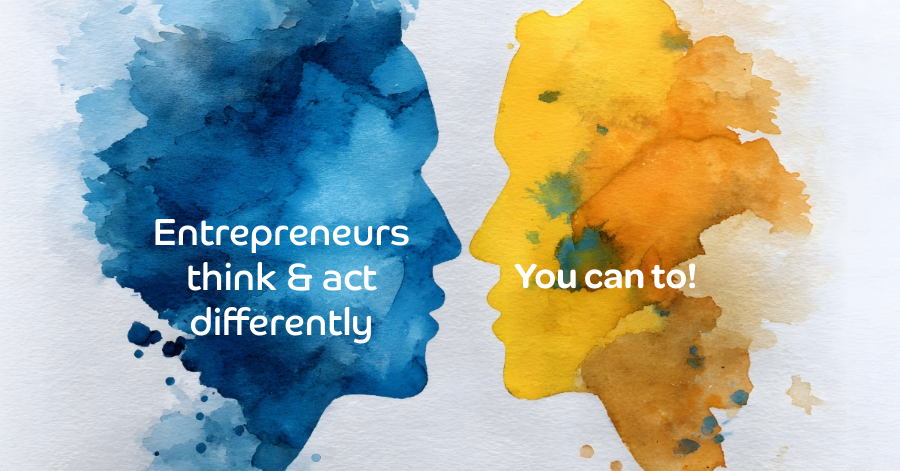Inside the Mindset of the Entrepreneur

Key Takeaways
- Entrepreneur behaviours suggest they have a different psychological structure.
- They are masters of risk-taking.
- Entrepreneurs are resourceful and frequently are necessity venture creators.
- They experiment with new ideas and business models.
- They seek out opportunities and often create new ones.
What separates an entrepreneur from an average bloke? What gives them the edge? Why can Elon Musk create so much value? The short answer is that they think and act differently. Entrepreneurs are wired uniquely, and it is this mindset that drives their super-performance.
Calculated risk-takers
People who take low risks often end up with low returns. Notice that the salaried worker in the public sector hardly achieves an ultra-wealthy status. Of course, you could add that they are pretty happy with their state-funded pensions, so it is a personal choice. Then there are the high-risk takers, who will make big bets, either in investments or as gamblers. Speculators are not entrepreneurs, as they put less thought into how to manage their assets.
But risk-taking is not just high or low; it is a continuum, and there is a Goldilocks zone somewhere in the middle. Entrepreneurs know how to find and capitalise on the opportunities for success. Some research points to dispositions that can be both nature and nurture. But nurturing an entrepreneur, either through education or exposure to life’s events, can dramatically shape one’s approach to risk acceptance. Finally, moderate risk-takers explore areas of uncertainty and find ways to reduce risk by using multiple techniques.
Resourcefulness
Entrepreneurs take more diminutive chances than gamblers. The former will take less risk because they know their idea is unproven. Do you bet the farm on a hunch? No, but entrepreneurs develop prototypes and get customer feedback. Market validation involves accepting that this is only an idea and may need refinement or elimination. The Lean Startup method explains that venture creators will be stingy with their resources and proceed with caution as they test their beliefs about the value of their product or service. In addition, entrepreneurs seek out resources that others have.
Experimenters
A startup is a business experiment. Entrepreneurs view the world as their laboratory, testing to see how the variables will react—customers and competitors. While entrepreneurs differ from scientists in a lab, they don’t require a very high burden of proof. Science is like a court; it needs evidence to convict. Public opinion needs little verification, religion a little more evidence, and the court of law requires more than both. However, recently, courts have adopted more scientific evidence, such as DNA evidence, to prove a case. While the court of science is the highest in the land, entrepreneurs’ courts do not wait for a complete picture, as the opportunity might evaporate. Moderate risk-takers also know that they can fix things as they go along. Scientists don’t think that way.
Creators
Entrepreneurs love to be builders—ventures, products, business models, and systems. But to be an originator often requires a different perspective. They see problems as opportunities, but more. I know of one entrepreneur who struggled in poverty after his father died and had little money to travel from central Trinidad to a Port-of-Spain school. While the average person will define the problem as “getting to school” (which would have led to no solution), he saw it differently as “getting an education”. Instead of begging for money to travel, he slept in the school’s washroom during the week.
Innovator
Creativity is the front end of innovation. Much of the world’s creations were developed by entrepreneurs whose heads weren’t stuck in the lab. One of the challenges in creating something new is whether the world will value it. Some crazy ideas made it (3M Post-it, Velcro), but most do not. The resourcefulness of entrepreneurs is often what saves the day. Why put all your eggs in one basket? Innovation, when accepted, is not recognised by all. Adopting a new invention often has an acceptance level that starts with a small group and gradually increases to significant customer approval. This slowly growing rate may mean that investments are needed to cushion the negative cash flow at the start.
Opportunistic
Our heroes treat opportunity differently. While the regular person will only look for a chance and often misses it, an entrepreneur sees it lurking beneath the surface. The Austrian entrepreneur Dietrich Mateschitz discovered a street drink in Thailand that he reformulated to western tastes and created a new category of beverages called energy drinks. Red Bull is an example of taking a new twist on something that existed but changed to give it global market acceptance.
The founders of Airbnb did not go looking for an opportunity but created one. The platform firm was founded in 2008 by Brian Chesky, Nathan Blecharczyk and Joe Gebbia. They effectively utilised this innovative approach to introduce additional hotel space into cyberspace. People outside the industry can now offer their spare rooms as hotels do, but at a much lower price.
Embrace uncertainty
Proceeding with an innovative idea is full of ambiguity. It is like the fog of war—the sight of things is restricted, and one doesn’t know what lurks in the bushes. The human mind does not like uncertainty, as it represents a threat. This fuzziness is sensed by our more primitive brain, which looks for things that could threaten our survival. Entrepreneurs may have found a way to calm this part of our mind and let the neocortex (rational mind) take over. This hack might arise from entrepreneurs’ tolerance for risk-taking.
Achievers
When one combines all the traits just described, it is no surprise that our heroes are super-achievers. They amass enormous wealth, profoundly change the world and boast about the next big thing. However, they focus less on wealth accumulation, diminishing returns when you have passed a certain level of wealth.
Achievement does not come easily, as entrepreneurs often experience a dark side—extreme hours of work, discouragement, and health challenges. Their personal lives pay a high price, as we saw recently with Bill Gates and Jeff Bezos.
Considering the good and bad sides of entrepreneurship, entrepreneurs may view themselves as risk-takers who operate in a Goldilocks zone where they can play, have fun, and achieve super success all in one psychological space.
Sajjad Hamid is an Entrepreneurship Educator who supports entrepreneurs in scaling their ventures. In his spare time in Trinidad and Tobago, he attempts to cultivate organic tropical fruits and vegetables, practising sustainable farming in his home garden.
He is the author of Build Your Legacy Business: Solopreneur To Family Business Hero. Sajjad is a Fellow of the Family Firm Institute. You can contact him at [email protected] or visit www.entrepreneurtnt.com.



Responses